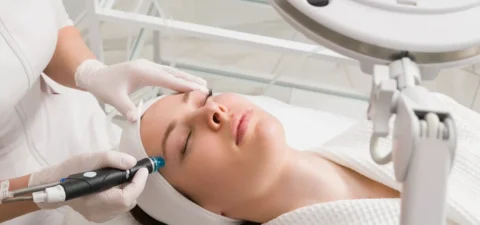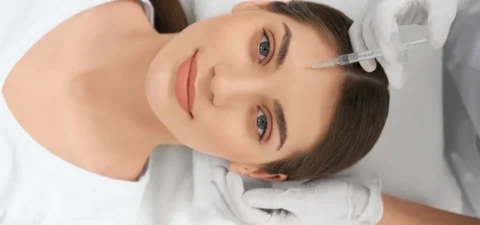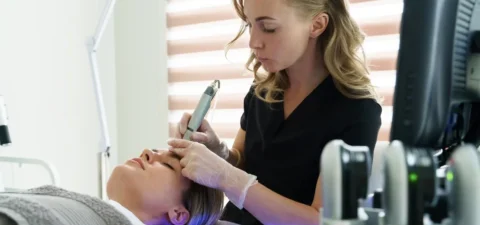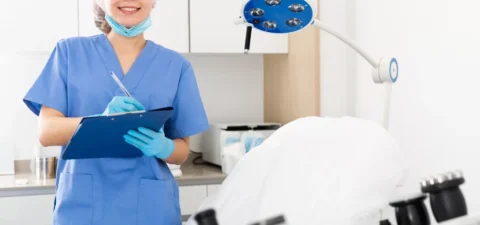For information only. Not meant as advice in any form. Please consult your medical professional or lawyer.
Esthetician licenses are not valid across state lines. While they may have roughly the same training requirements, the professional regulation surrounding esthetician licenses means that even if your valid license is good for one state, it may not be valid for another. Fortunately, you don’t need to get a new esthetician license every time you practice in another state.
So how can you transfer an esthetician license to another state? In the vast majority of cases, you should check if your overall experience (training hours and practical experience) meet the requirements of the state that you want to move to. Some may ask you to take a practical exam or a written exam. As long as you meet the requirements of the state board, your license can be transferred with no trouble.
How Do I Transfer My Esthetician License to Another State?
Transferring your state license means meeting the requirements, but it also requires you to fulfill the following general guidelines for practicing esthetic treatments in that state:
- A current license (valid license) for estheticians in your home state
- Good standing within the industry, no legal cases or other similar concerns
- Must have gone through cosmetology school, beauty academy, or any other certified and accredited program for estheticians
- If the above does not apply, the prerequisite certification from practical experience with esthetician services (or apprenticeship)
- Able to meet the renewal requirements for esthetician licenses in your new state
More specific details about transferring licenses across states fall under that specific state’s reciprocity guidelines, which are the key part of making sure your valid license is valid in whichever state you’re planning to practice.
What Does “Reciprocity” Mean for Estheticians?
Reciprocity (or endorsement) is the process of transferring a valid license from your home state to another one. While the training of an esthetician is more or less consistent across state lines, the regulations of a state license will vary from state to state.
As a result, even if you’ve gotten your certification to practice esthetics in your home state, the requirements of the state that you’re moving to can vary. Some states are more strict than others (usually states that already have a high rate of estheticians) while others will accept licenses even if the training requirements weren’t fulfilled in that state.
Why Reciprocity Is Needed
Reciprocity of esthetician licenses is required because each state has its own regulations about the practice of estheticians. Licensing regulations are not always equal across state lines, and while estheticians are expected to undergo training – the exact training hours or even the kind of experience they have will not always have the same weight in other states.
Esthetician reciprocity is necessary to ensure that the quality of service of skin care treatments in your new state is up to standard. More than that, it makes sure that the training that you receive is equivalent to or more to the estheticians who are already practicing in that state – which promotes fair competition and ensures that your clients will receive the best care possible.
State Reciprocity Requirements: A Summary
If you’re looking to transfer your esthetician license from one state to another, here are states that accept the various different types of licenses + additional requirements, if needed:
States That Accept Any Valid Esthetician License From Your Home State
- Alabama
- Arizona
- Arkansas
- California
- District of Columbia
- Illinois
- Kansas
- Louisiana
- Mississippi
- Montana
- Nevada
- Pennsylvania
- South Carolina
- Washington
Keep in mind that simply having a valid license back in your home state does not always equal the automatic transfer of your license to any of these states. You will still need to pay the administrative fees for applying for a license and submit other requirements they may need, like endorsement letters or copies of your licenses/certifications.
But if you are looking for states where it would be fairly easy to move your esthetics practice, the states above are the best possible options you can pick from. Just make sure to double-check the requirements for licensing from the local state board, and you’re more or less set.
States That Accept Any Valid Esthetician Licenses From Your Home State (With Training Hour Requirements)
- Alaska (must meet or surpass 1,500 hours of training)
- Colorado (must meet or surpass 600 hours of training)
- Connecticut (must meet or surpass 1,500 hours of training)
- Delaware (must meet or surpass 1,500 hours of training)
- Florida (must meet or surpass 260 hours of training)
- Georgia (must meet or surpass 1,500 hours of training)
- Indiana (must meet or surpass 700 hours of training)
- Iowa (must meet or surpass 600 hours of training)
- Kentucky (must meet or surpass 750 hours of training)
- Maine (must meet or surpass 600 hours of training)
- Maryland (must meet or surpass 600 hours of training)
- Michigan (must meet or surpass 400 hours of training)
- Minnesota (must meet or surpass 600 hours of training)
- Missouri (must meet or surpass 750 hours of training)
- Nebraska (must meet or surpass 600 hours of training)
- New Hampshire (must meet or surpass 600 hours of training)
- New Jersey (must meet or surpass 600 hours of training)
- New Mexico (must meet or surpass 600 hours of training)
- New York (must meet or surpass 600 hours of training)
- North Carolina (must meet or surpass 600 hours of training)
- North Dakota (must meet or surpass 600 hours of training)
- Ohio (must meet or surpass 600 hours of training)
- Oklahoma (must meet or surpass 600 hours of training)
- Oregon (must meet or surpass 500 hours of training)
- Rhode Island (must meet or surpass 600 hours of training)
- South Dakota (must meet or surpass 600 hours of training)
- Tennessee (must meet or surpass 750 hours of training)
- Texas (must meet or surpass 750 hours of training)
- Utah (must meet or surpass 600 hours of training)
- Vermont (must meet or surpass 600 hours of training)
- Virginia (must meet or surpass 600 hours of training)
- West Virginia (must meet or surpass 600 hours of training)
- Wisconsin (must meet or surpass 450 hours of training)
- Wyoming (must meet or surpass 600 hours of training)
These states still accept valid licenses from your home state, but your home state’s requirements must meet or surpass a specific number of training hours to apply. Even if you meet the required training hours, you will still need to pay the prerequisite fees and process the needed paperwork.
Since the majority of states fall under these licensing requirements, here are some other things you need to keep in mind when applying for reciprocity or endorsement:
- The need to take both practical and written exams
- Whether your license is active (a temporary license does not apply)
- No criminal convictions or other similar cases
- Whether you’ve been working actively in the esthetics industry before the application
- If you’ve passed both written and practical exams from the National Interstate Council of State Boards of Cosmetology (NIC)
- Any notarized affidavits of work experience, apprenticeship, and other similar paperwork
In most cases, these states can still accept your license even if you fall under the required number of hours, though you will most likely have to take additional training hours or the corresponding amount of work experience.
States That Do Not Recognize Esthetician Licenses From Other States
- Hawaii
- Massachusetts
These two states do not recognize estheticians’ licenses from other states. You will have to comply with their own regulations and take the written and practical exams in each one to get a valid license in that state, though they will recognize the training that you’ve received in your home state.
FACE MED Store: Your Partner For High-Quality And Affordable Medical Supplies
Experience may be what makes a cosmetic esthetician stand out, but that experience isn’t always equal across state lines. If you’re an esthetician in the United States and want to get work experience in another state aside from your own, you need to make sure that you comply with that state’s licensing requirements to ensure your own state license is valid.
FACE Med Store has extensive experience in providing our clients with the best medical tools and supplies, balancing the need for quality with cost. We help cosmetic and medical practices all around the country administer their treatments with reliable products and equipment and help patients stock their own cabinets with their own supplies.
For more information about us and our stocks, visit our website today.






